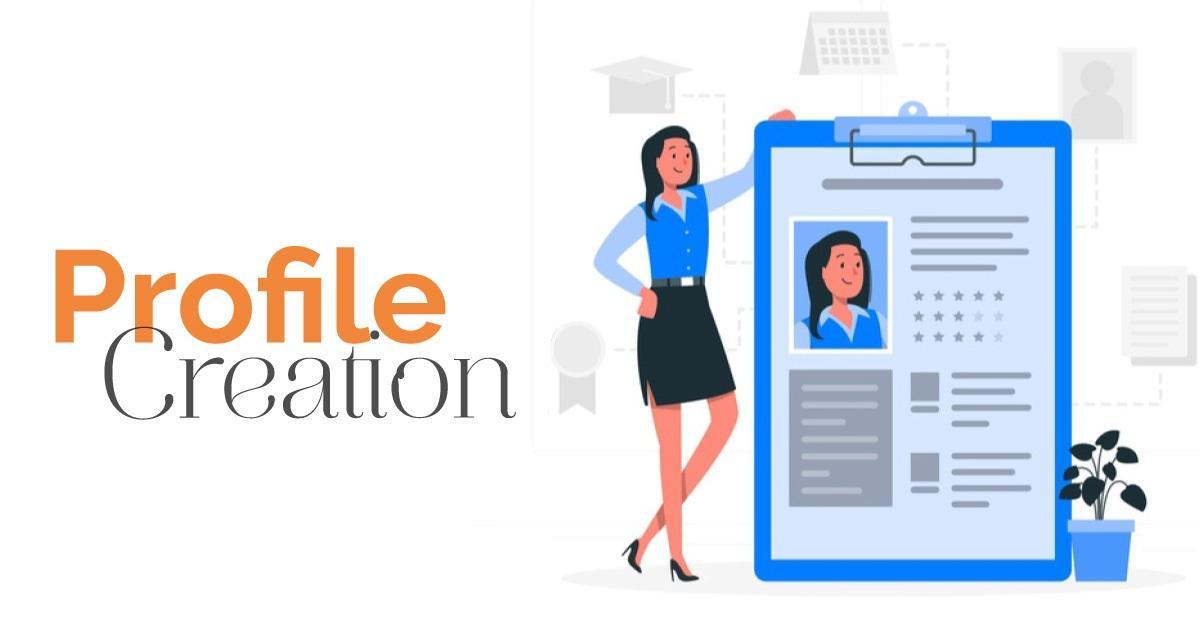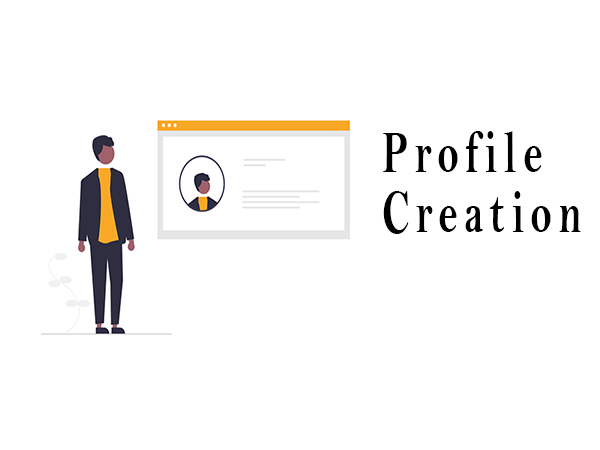Introduction
In the vast landscape of the internet, your profile is your digital identity. This article unveils the nuances of profile creation and optimization, providing you with a roadmap to enhance your online presence. From the basics to advanced strategies, we've got you covered.
A. Definition and Purpose of a Digital Profile
In the digital age, a digital profile refers to the amalgamation of information, activities, and interactions that collectively represent an individual or entity on the internet. It serves as a virtual identity, reflecting various aspects of a person's life, interests, and affiliations. The purpose of a digital profile is multi-faceted, encompassing personal expression, professional networking, and social engagement.
On a personal level, individuals create digital profiles to share their experiences, thoughts, and interests with a global audience. Social media platforms like Facebook, Instagram, and Twitter provide spaces where users can curate their digital identities, connecting with friends and family across the globe. These profiles act as windows into one's life, enabling others to gain insights into their personality, hobbies, and daily activities.
Professionally, digital profiles play a pivotal role in establishing and nurturing a virtual presence. Platforms such as LinkedIn cater specifically to professional networking, allowing users to showcase their skills, accomplishments, and work history. A well-crafted professional profile can enhance career opportunities, enabling individuals to connect with potential employers, clients, or collaborators.
Types of Online Profiles (Social Media, Professional Networks, Forums)
Social Media Profiles
Social media profiles dominate the online landscape, offering individuals a platform to share personal experiences, connect with others, and express their thoughts. Popular social media platforms include Facebook, Instagram, Twitter, and Snapchat. These profiles typically feature a mix of photos, status updates, and shared content, providing a dynamic representation of a person's social life.
Professional Network Profiles
Professional networking profiles, exemplified by LinkedIn, cater specifically to the business and career aspects of one's life. These platforms allow individuals to create a digital resume, highlighting their professional achievements, skills, and endorsements. Networking on these platforms can lead to job opportunities, partnerships, and collaborations.
Forum Profiles
Forums and online communities provide another avenue for digital expression. Users engage in discussions, share expertise, and build a reputation within niche communities. Profiles on forums often showcase a user's contributions, expertise, and the duration of their membership, creating a digital footprint in specific interest areas.
Significance of a Consistent and Cohesive Online Identity
Maintaining a consistent and cohesive online identity is crucial for several reasons, both personal and professional.
Professional Branding
For professionals, a consistent online identity builds a strong personal brand. Employers and colleagues may perceive a cohesive digital presence as a reflection of organizational skills, reliability, and professionalism. A unified brand across platforms reinforces key messages about an individual's expertise and values.
Trust and Credibility
Consistency in digital profiles enhances trust and credibility. Whether in personal relationships or professional endeavors, a coherent online identity fosters a sense of authenticity. Inconsistencies or conflicting information may raise doubts about an individual's reliability.
Search Engine Optimization (SEO)
Search engines prioritize consistent and relevant content. A unified online identity with consistent information across various platforms increases the chances of visibility in search engine results. This can be especially beneficial for professionals and businesses seeking to enhance their online presence.
Profile Picture: Choosing the Right Image
Your profile picture is often the first impression you make in the digital world. It's a visual representation of who you are and sets the tone for your online presence. When selecting the right image, consider these key elements for a profile picture that leaves a lasting impact.
Firstly, aim for a high-quality image. A clear, well-lit photo will convey professionalism and attention to detail. Whether it's a headshot or a full-body picture, make sure it accurately represents you and your personal brand.
Additionally, consider the context of your online presence. If you're a professional, a more formal headshot may be appropriate. On the other hand, if your brand is more casual or creative, a friendly and approachable photo might be a better fit. The key is authenticity – choose an image that aligns with your personality and the image you want to project.
Don't forget about consistency across platforms. Using the same profile picture across your various online accounts creates a cohesive brand identity. This visual consistency helps people recognize and remember you, building trust and familiarity.
In terms of SEO, ensure your image file is appropriately named with relevant keywords. For example, instead of a generic filename, use your name or profession. Search engines consider file names when indexing, so this small detail can contribute to your online visibility.
Bio/About Me Section: Crafting a Compelling and Concise Introduction
Your bio or "About Me" section is a golden opportunity to tell your story and engage your audience. Crafting a compelling and concise introduction is crucial for making a strong impression. Here are some tips to optimize your bio for both readers and search engines.
Start with a hook – a captivating opening that grabs attention. This could be a unique aspect of your personality, a professional achievement, or a mission statement. Aim to captivate your audience from the first sentence.
Next, provide a brief overview of who you are, highlighting key accomplishments and expertise. Use language that resonates with your target audience. If you have a specific niche or specialization, make it clear in your bio. This not only helps your audience understand your expertise but also improves your visibility in relevant search results.
Incorporate relevant keywords naturally throughout your bio. Think about the terms people might use when searching for someone with your skills or background. This strategic use of keywords can enhance your discoverability on search engines and professional networking platforms.
Keep your bio concise and easy to read. Break up paragraphs, use bullet points, and consider adding a call-to-action. Whether it's directing readers to your website, inviting them to connect, or encouraging them to explore your work, guide them toward the next step.
Contact Information: Ensuring Accessibility While Maintaining Privacy
Providing contact information is essential for accessibility, networking, and potential opportunities. However, it's equally important to balance accessibility with privacy. Here's how to optimize your contact information section for both aspects.
Include at least one professional email address. This creates a direct channel for communication and collaboration. Avoid using overly personal or informal email addresses in your professional profiles.
Consider adding a link to your professional website or portfolio. This not only gives people more information about you but also serves as a hub for all your online activities. Ensure that your website is up to date and aligns with your personal brand.
For privacy, be cautious about sharing personal phone numbers or addresses on public profiles. If you prefer not to share specific contact details, consider providing a contact form on your website. This allows people to reach out without revealing your direct contact information.
Optimize your contact information for search engines by using relevant keywords. For instance, include your location if it's relevant to your professional identity. This can enhance local search visibility and connect you with opportunities in your area.

Customizing URLs and Handles for Brand Consistency
Customizing URLs and handles across platforms may seem like a small detail, but it plays a crucial role in establishing brand consistency and enhancing your online presence. Here's how to optimize these elements for both brand identity and search engine optimization.
Start by customizing your profile URL on platforms that allow it, such as LinkedIn or Twitter. Ideally, use your full name or a professional variation. This not only looks more polished but also contributes to your personal branding.
Consistency is key across all your online handles. Whether it's your Twitter username, Instagram handle, or LinkedIn URL, try to keep them uniform or as close as possible. This helps with brand recognition and makes it easier for people to find you on different platforms.
Include relevant keywords in your handles and URLs. If you have a specific area of expertise, incorporating relevant terms can improve your discoverability on search engines and within each platform's search functionality.
Avoid using obscure abbreviations or special characters in your handles. Clarity is essential, and using easily recognizable names or variations increases the likelihood that people will remember and accurately search for you.
How crucial is profile optimization in the digital age?
In the highly competitive digital landscape, profile optimization is paramount. A well-optimized profile not only enhances visibility but also establishes credibility.
Can I use the same profile across multiple platforms?
While consistency is key, tailor your profile to each platform's audience and norms. Customize your content to resonate with diverse audiences while maintaining a cohesive brand image.
Is it necessary to update my profile regularly?
Absolutely. Regular updates reflect your evolving skills and achievements. Keep your audience engaged with fresh content, showcasing your continuous growth and relevance.
What role do visuals play in profile optimization?
Visuals are pivotal. An optimized profile picture and media convey professionalism and authenticity, significantly impacting the first impression you leave on visitors.
How can I leverage endorsements for maximum impact?
Seek endorsements from credible sources within your network. Showcase these endorsements strategically, emphasizing the skills and attributes most relevant to your goals.
How do I balance privacy and visibility on my profile?
Customize privacy settings based on your comfort level and professional goals. Strike a balance that ensures visibility to the right audience while safeguarding personal information.
Conclusion
As we conclude this journey into the realm of profile creation and optimization, remember that your digital identity is a canvas waiting for your artistic touch. Craft it with care, strategically optimizing each element to resonate with your audience and leave an indelible mark on the digital landscape.

